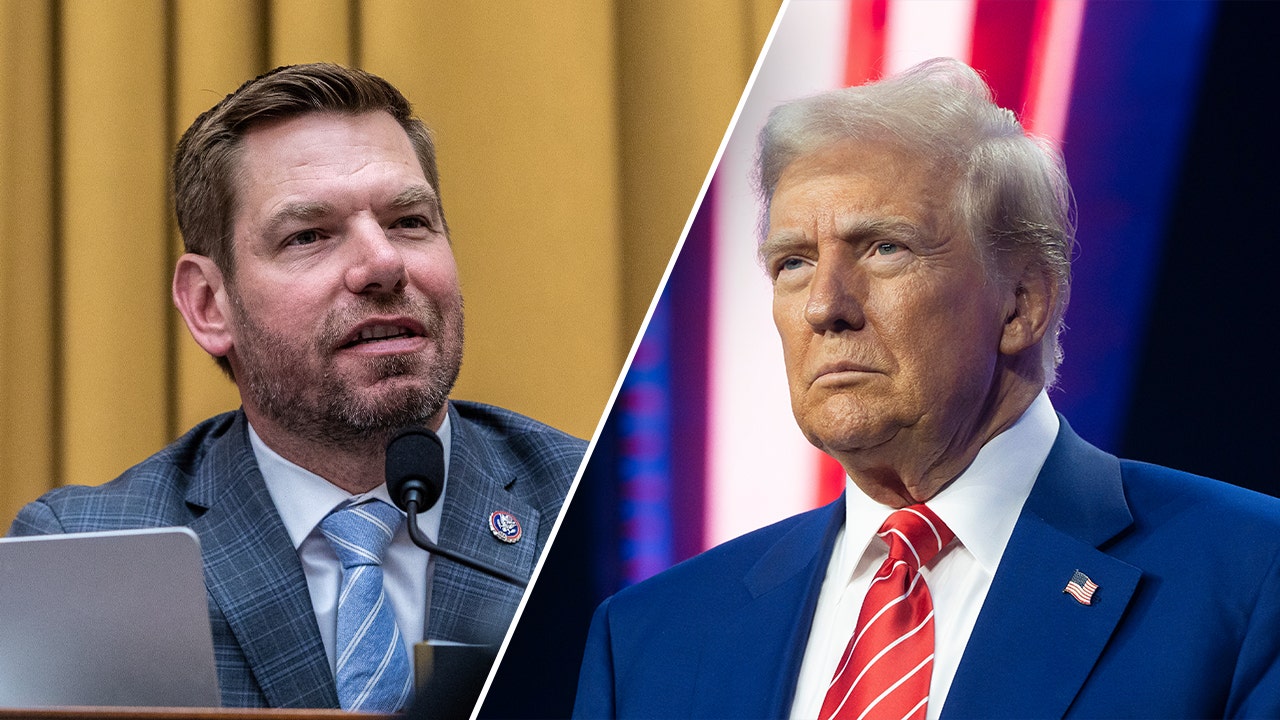Politics
Trump files emergency petition to Supreme Court to prevent sentencing in NY v. Trump

President-elect Trump on Wednesday morning filed an emergency petition to the United States Supreme Court in an effort to block his sentencing in New York v. Trump.
Judge Juan Merchan set Trump’s sentencing in New York v. Trump for Jan. 10 after a jury found the now-president-elect guilty of falsifying business records in the first degree, stemming from Manhattan District Attorney Alvin Bragg’s investigation. Trump pleaded not guilty to all charges and has appealed the ruling but was rejected last week by Merchan.
NEW YORK JUDGE SETS TRUMP SENTENCING DAYS BEFORE INAUGURATION
“President Trump’s legal team filed an emergency petition with the United States Supreme Court, asking the Court to correct the unjust actions by New York courts and stop the unlawful sentencing in the Manhattan D.A.’s Witch Hunt,” Trump spokesman and incoming White House communications director Steven Cheung told Fox News Digital.
“The Supreme Court’s historic decision on Immunity, the Constitution, and established legal precedent mandate that this meritless hoax be immediately dismissed.”
Cheung said the “American People elected President Trump with an overwhelming mandate that demands an immediate end to the political weaponization of our justice system and all of the remaining Witch Hunts.”
He added: “We look forward to uniting our country in the new administration as President Trump makes America great again.”
Former President Donald Trump attends the first day of his trial at Manhattan Criminal Court in New York City on April 15. Judge Juan Merchan poses for a picture in his chambers on March 14 in New York. (Angela Weiss/AFP via AP, POOL/AP)
TRUMP FILES MOTION TO STAY ‘UNLAWFUL SENTENCING’ IN NEW YORK CASE
Trump’s lawyers, in its petition to the high court, said it should “immediately order a stay of pending criminal proceedings in the Supreme Court of New York County, New York, pending the final resolution of President Trump’s interlocutory appeal raising questions of Presidential immunity, including in this Court if necessary.”
“The Court should also enter, if necessary, a temporary administrative stay while it considers this stay application,” the filing states.

Manhattan District Attorney Alvin Bragg arrives at Daniel Penny’s trial following a lunch break at the Manhattan Supreme Criminal Court building in New York City on Monday, Dec. 2, 2024. (Julia Bonavita/Fox News Digital)
Trump attorneys also argued that New York prosecutors erroneously admitted extensive evidence relating to official presidential acts during trial, ignoring the high court’s ruling on presidential immunity.
The Supreme Court, earlier this year, ruled that presidents are immune from prosecution related to official presidential acts.
Trump’s legal team is arguing Merchan should not be permitted to move any further, and said their appeal on the ruling “will ultimately result in the dismissal of the District Attorney’s politically motivated prosecution that was flawed from the very beginning, centered around the wrongful actions and false claims of a disgraced, disbarred serial-liar former attorney, violated President Trump’s due process rights, and had no merit.”
“In the meantime, the New York trial court lacks authority to impose sentence and judgment on President Trump—or conduct any further criminal proceedings against him—until the resolution of his underlying appeal raising substantial claims of Presidential immunity, including by review in this Court if necessary,” the filing states. “As discussed herein, this Court should order an immediate stay of criminal proceedings against President Trump in the New York trial court, including but not limited to the criminal sentencing hearing scheduled for January 10, 2025, at 9:30 a.m.”
New York has to file a written response by Thursday at 10:00 a.m.
JUDGE DENIES TRUMP MOTION TO STOP NY CRIMINAL CASE SENTENCING
The filing to the United States Supreme Court comes after a judge in New York on Tuesday denied Trump’s motion to stay the Jan. 10 sentencing, which is currently set for Friday, Jan. 10, at 9:30 a.m.
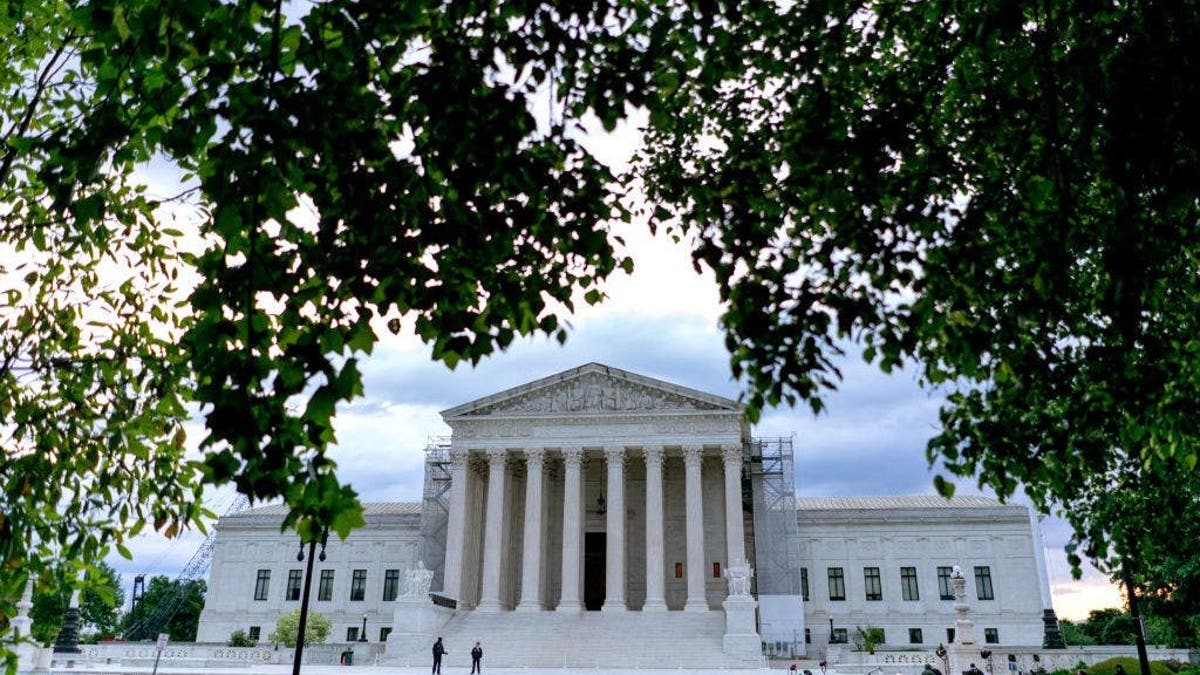
U.S. Supreme Court. Howard/Bloomberg via Getty Images
Merchan set the sentencing date last week but said he will not sentence the president-elect to prison.
Merchan wrote in his decision that he is not likely to “impose any sentence of incarceration,” but rather a sentence of an “unconditional discharge,” which means there would be no punishment imposed.
Trump will be sworn in as the 47th President of the United States on Jan. 20.
Trump has maintained his innocence in the case and repeatedly railed against it as an example of “lawfare” promoted by Democrats in an effort to hurt his election efforts ahead of November.
Fox News’ Shannon Bream and Bill Mears contributed to this report.

Politics
Trump details strategy to get necessary votes with one-bill approach to border, taxes

President-elect Trump pointed to a strategic benefit of the one-bill approach to budget reconciliation that he’s said he prefers during a closed-door meeting with Republican senators on Wednesday evening at the Capitol.
By combining legislation relating to both the southern border crisis and taxes into one reconciliation bill, Trump suggested that one issue could potentially force some lawmakers to make a difficult decision. For example, if a Republican doesn’t support a piece of the tax component, they would also have to vote against the border provisions because they are in one measure.
SENATE DEMS TO JOIN REPUBLICANS TO ADVANCE ANTI-ILLEGAL IMMIGRATION BILL NAMED AFTER LAKEN RILEY
Trump explained a strategic component to his one-bill reconciliation approach. (Getty Images)
With portions of Trump’s 2017 Tax Cuts and Jobs Act expiring this year, the party is looking to act quickly. But the tax debate in 2025 is expected to be more divided among Republicans than that regarding the border. In particular, there is some disagreement in the party on state and local tax (SALT) deductions, which can benefit some states more than others and have been hit by some Republicans as inefficient.
“If somebody, for example, in the House is balking because there’s not SALT in the tax agreement or some other provision they want, if that also means they’d be holding out and voting against the border, it might make it harder for them to do so,” Sen. John Hoeven, R-N.D., told Fox News Digital. “That’s a very valid point.”
While SALT was not posed as an example of this by Trump himself, it was mentioned by a GOP senator in a side conversation among other attendees as they went over the advantages of a one-bill approach, Hoeven said.
BORDER STATE DEMOCRAT RUBEN GALLEGO BACKS GOP’S LAKEN RILEY ACT AHEAD OF SENATE VOTE
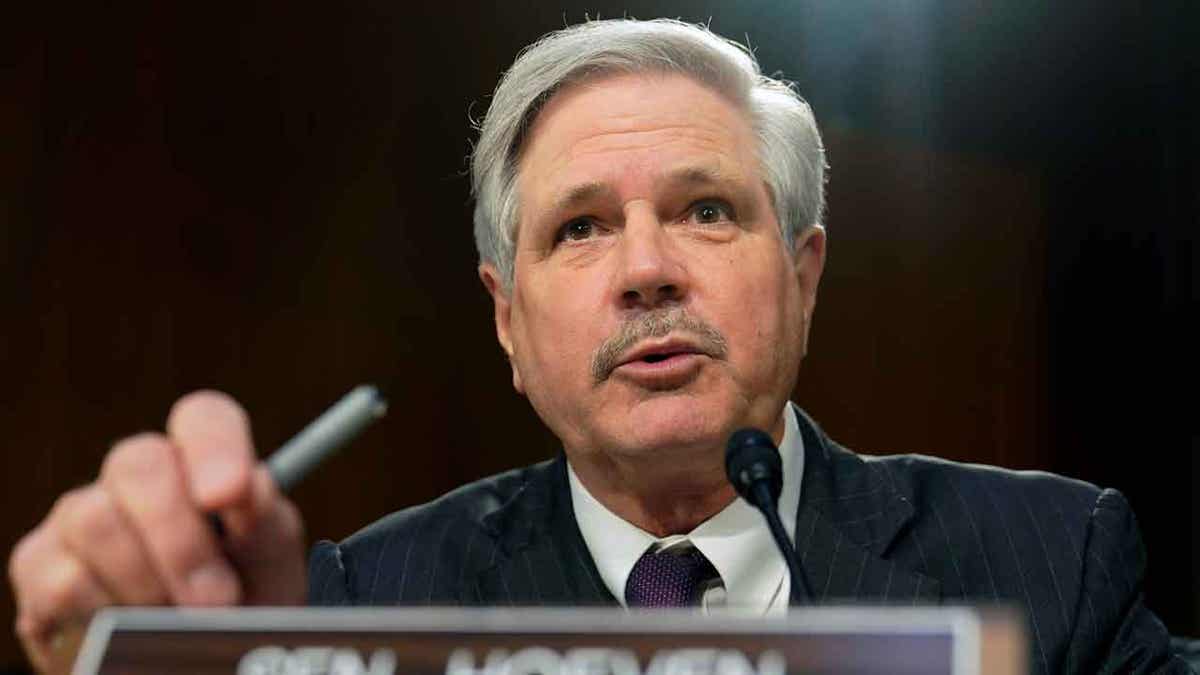
Sen. John Hoeven, R-N.D., speaks May 4, 2022, on Capitol Hill in Washington. Hoeven faces a defector from his own party and a lightly funded Democrat on Tuesday, Nov. 8, in his race for a third U.S. Senate term from North Dakota. (AP Photo/Mariam Zuhaib, File)
A source familiar told Fox News that Republicans are preparing to go with Trump’s one-bill preference, but they are also keeping the potential for two bills, one on the border and another to address taxes, in their back pocket in the case of any significant obstacles.
Senate Majority Leader John Thune, R-S.D., told Trump that if one bill is what he wanted, that is what they are going to try first, the source said.
A number of senators have their own preferences for two separate reconciliation bills instead, and some made their cases to Trump during the meeting. However, the conference is set to move forward with Trump’s one-bill approach.
RFK JR. TO MEET WITH SLEW OF DEMS INCLUDING ELIZABETH WARREN, BERNIE SANDERS
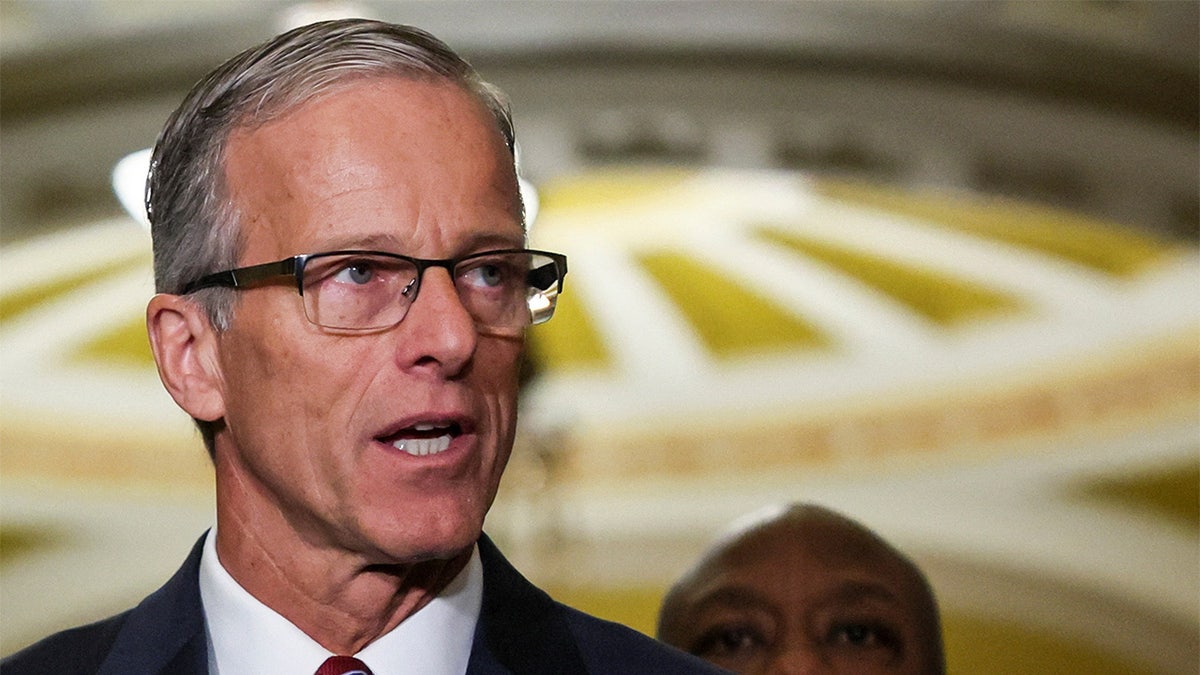
Thune was “adamant” about supporting Trump’s agenda as leader, one senator said. (Reuters)
Greenland, Canada and the Panama Canal came up during the discussion following Trump’s remarks about each. Trump has recently said he wants U.S. to take back control of critical trade medium the Panama Canal, while also expressing interest in making Greenland and Canada part of the U.S.
Sources familiar told Fox News that Trump brought these up himself during the meeting, telling senators at one point that these countries “were screwing with” the U.S.
TRUMP, GOP SENATORS TO HUDDLE AT CAPITOL, WEIGH STRATEGY ON BUDGET, TAXES AND BORDER
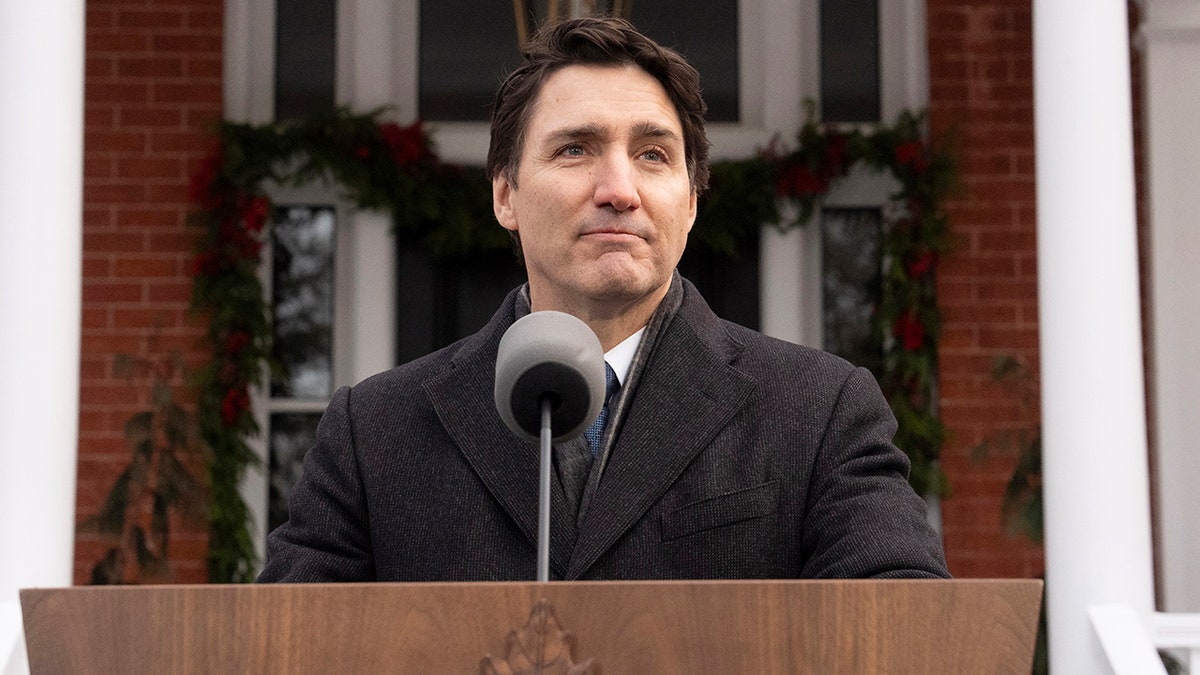
Canada Prime Minister Justin Trudeau speaks with media outside Rideau Cottage on Monday, Jan. 6, in Ottawa. (AP/Adrian Wyld/The Canadian Press)
Several GOP senators took the opportunity to tell Trump that his comments on Canada were “transformative,” the sources said.
The senators believe his approach to Canada is already managing to change the country’s “behavior” and could have even contributed to the recent resignation of Canadian Prime Minister Justin Trudeau, the sources added.
Politics
Daniel Lurie inaugurated as San Francisco's new mayor: 'This is where our comeback begins'

SAN FRANCISCO — Four hours before he took the oath of office Wednesday to become San Francisco’s 46th mayor, Daniel Lurie started his day walking through the bleak confines of the Tenderloin district with the city police chief and passing out coffee to people at a homeless community center.
It was a deliberately symbolic move by Lurie, a nonprofit executive and heir to the Levi Strauss family fortune, who won office in November largely by appealing to disillusioned voters weary of the public drug use, brazen retail theft and sprawling homelessness that during the pandemic became commonplace in the Tenderloin and spilled into the downtown financial district.
Mayor-elect Daniel Lurie and his wife, Becca Prowda, take part in Wednesday’s inaugural festivities.
(Gabrielle Lurie / San Francisco Chronicle)
In his inaugural speech shortly before noon in front of San Francisco City Hall, Lurie pledged to crack down on the street anarchy that has plagued some areas of the city in recent years, feeding a “doom loop” scenario endorsed by conservative pundits.
“This is where our comeback begins,” Lurie said to a crowd of thousands that included his wife, Becca Prowda, daughter Taya, 13, and son Sawyer, 10, along with outgoing Mayor London Breed and a host of local and statewide political figures.
“I’m asking all of you, every single one of you, to join me in reclaiming our place as the greatest city in the world with a new era of accountability, service and change,” Lurie said.

Daniel Lurie is sworn in as San Francisco’s 46th mayor.
(Gabrielle Lurie / San Francisco Chronicle)
Lurie, a moderate Democrat who had never held elected office, entered the mayoral race as an underdog against Breed and three other City Hall veterans. In an election seen as a referendum on the city’s post-pandemic struggles with homelessness and street crime, Lurie pitched himself as a change agent who could lead San Francisco into an era of recovery.
His campaign gained momentum as he promised to end open-air drug markets and arrest fentanyl dealers, push homeless people into drug and mental health treatment and reinvigorate a downtown economy drained by the exodus of tech workers after COVID-19 shutdowns made remote work an easy option.
Lurie was able to spread his message broadly by drawing on personal wealth. He funneled nearly $9 million of his own money into his campaign, while his mother, Miriam Haas, widow of deceased Levi’s executive and heir Peter Haas, contributed an additional $1 million to an independent expenditure committee backing his election.
Lurie’s inaugural speech, though light on policy details, offered a glimpse into how he planned to accomplish the bold goals he laid out on the campaign trail.
“San Francisco has long been known for its values of tolerance and inclusion, but nothing about those values instructs us to allow nearly 8,000 people to experience homelessness in our city,” he said. “Widespread drug-dealing, public drug use and constantly seeing people in crisis has robbed us of our sense of decency and security.”
At the top of his to-do list: introducing a package of ordinances declaring a fentanyl state of emergency. Lurie said he would ask the Board of Supervisors, an 11-member body that acts as the legislative branch for the city and county, to quickly approve the ordinances, directed at curbing use of the deadly opioid and allowing the city to “bypass the bureaucratic hurdles standing in the way of tackling this crisis.”
The board gained five new members in the November election, a turnover expected to bring a more moderate tone to a board that for years was seen as ultra-liberal and often tussled with Breed — also a moderate — over tough-on-crime policy proposals.
Lurie said he would work to embed more behavioral health specialists in first-responder units to address the overlapping crises of homelessness, addiction and untreated mental illness, and announced plans to open a 24/7 center as an alternative to jail for police to bring people in need of treatment and other services.
He also said he wants to expand a city program that provides funding and assistance for bus tickets and other transportation to send homeless people who aren’t from San Francisco back to their home communities.
And in the face of a projected $876-million budget deficit, Lurie promised “zero cuts” to sworn police officers, 911 operators, EMTs, firefighters and nurses on the front lines of public health emergencies.
San Francisco Police Chief Bill Scott said he was encouraged by Lurie’s plans and his recognition of the need for “around-the-clock resources” not just for police, but also for city workers across departments working to solve San Francisco’s public safety and health challenges.
“The Police Department is 24/7 … but a lot of the departments that we rely upon to help solve some of these problems aren’t 24/7,” he said. “It’s not all about enforcement. It’s not all about policing.”
Scott said he would like to see Lurie continue recent efforts by Breed’s administration to more aggressively clear sprawling tent encampments that have fanned out across the city, as well as public health efforts credited for a sharp decline in drug overdose deaths in the city last year.
The chief medical examiner’s office recorded 586 fatal overdoses in San Francisco in the first 11 months of 2024 — a nearly 23% decrease, or 174 fewer deaths, compared with the first 11 months of 2023. San Francisco public health experts attributed the decline to the widespread availability of naloxone, a medication that can rapidly reverse the effects of opioid overdoses, as well as more emphasis on prescribing buprenorphine and methadone, medications that treat opioid addiction long-term.
On Tuesday, Breed’s last full day in office, her administration noted that crime rates had also fallen in 2024, with reports of car break-ins dropping 54%, property crime down 31% and violent crime down 14%.
Though San Francisco’s struggles have made national headlines in recent years, particularly in right-wing media promoted by President-elect Donald Trump, Lurie largely left national politics out of his messaging, nodding only once during his speech to the “great sense of fear and loss about the state of our country right now.”
“San Francisco must be a city where every individual feels safe, valued and empowered,” he said. “That means standing firm against discrimination and fighting for the dignity of all communities, no matter what comes our way.”
Lurie said the city is showing progress and maintained that “hope is alive and well in San Francisco.” But he warned that “lasting change doesn’t happen overnight.”
Still, “if we are consistent, if we have vision, if we aren’t afraid to make tough decisions,” he said, “San Francisco will rise to new heights.”
Politics
Trump Inauguration, Awash in Cash, Runs Out of Perks for Big Donors

President-elect Donald J. Trump’s inaugural committee is no longer selling tickets for major donors to attend his swearing-in and accompanying private events in Washington, according to five people briefed on the conversations.
The committee has raised over $170 million, according to the people, who insisted on anonymity because they were not authorized to share internal financial information. The haul is so big that some seven-figure donors have been placed on wait lists or have been told they probably will not receive V.I.P. tickets at all because the events are at capacity.
Mr. Trump often talks privately about who has supported him, and the frenzy to donate to his inauguration — even if it comes without the usual exclusive access — underscores the degree to which deep-pocketed donors and corporations are seeking to curry favor with him. Far more than in early 2017 at the start of his first term, corporate America has largely embraced Mr. Trump during his transition, partly out of a desire to get on his good side.
Prospective donors began to be told early this week that no more seats were available for certain events around Washington, according to the people briefed on the conversations. The personalized donation link that fund-raisers had circulated to their networks of major contributors no longer worked on Tuesday and Wednesday. The packages offered to corporate and individual donors had originally been marketed as available through Friday, but they ended early given the extraordinary demand.
“Space is limited,” read the marketing materials for the donor packages.
Individual donors and others can still attend the swearing-in ceremony by obtaining free tickets made available to the public through members of Congress.
The sums raised by Mr. Trump had already set a record for inaugural fund-raising. Mr. Trump’s 2017 inauguration committee raised $107 million, and the current one is on pace to approach $200 million, according to one person briefed on the fund-raising.
The leftover money is likely to be transferred to a committee for the eventual Trump presidential library. Mr. Trump’s allies have now raised more than $250 million since Election Day for his political projects, including the inaugural committee and some allied outside groups. There are no limits on donations to inaugural committees, though foreign nationals are prohibited from giving. The contributions are eventually disclosed.
On account of the shortage of seating at V.I.P. events, some donors have taken the unusual step of offering donations as high as $1 million without receiving anything in return. Seats at the inaugural address, tickets to the ritzy balls or access to other events are typically a major part of why major donors cut checks. Inaugural events are a key time for the lobbying industry, and they draw donations from corporations and wealthy donors eager to gain influence or make amends with a new administration.
Fund-raisers have not always told prospective donors that they can still give money even though the events are full, and so some last-minute donors have felt shut out of contributing.
“Anyone interested in making a contribution to the Trump-Vance Inaugural Committee is encouraged to do so,” said Danielle Alvarez, a spokeswoman for the committee. “There is an incredible interest and excitement for President Trump’s inauguration and the events surrounding.”
Inauguration events begin on Jan. 17. Those who gave $1 million or raised $2 million were supposed to be entitled to six tickets each for six different events, according to an updated list of benefits, including the swearing-in ceremony and a sought-after “candelight dinner” on Jan. 19 with Mr. Trump and his wife, Melania, that is described as the weekend’s “pinnacle event.”
They also received two tickets to a dinner with Vice President-elect JD Vance and his wife, Usha.
-

 Business1 week ago
Business1 week agoThese are the top 7 issues facing the struggling restaurant industry in 2025
-

 Culture1 week ago
Culture1 week agoThe 25 worst losses in college football history, including Baylor’s 2024 entry at Colorado
-

 Sports1 week ago
Sports1 week agoThe top out-of-contract players available as free transfers: Kimmich, De Bruyne, Van Dijk…
-

 Politics6 days ago
Politics6 days agoNew Orleans attacker had 'remote detonator' for explosives in French Quarter, Biden says
-

 Politics6 days ago
Politics6 days agoCarter's judicial picks reshaped the federal bench across the country
-

 Politics4 days ago
Politics4 days agoWho Are the Recipients of the Presidential Medal of Freedom?
-

 Health3 days ago
Health3 days agoOzempic ‘microdosing’ is the new weight-loss trend: Should you try it?
-

 World1 week ago
World1 week agoIvory Coast says French troops to leave country after decades





/cdn.vox-cdn.com/uploads/chorus_asset/file/24401980/STK071_ACastro_apple_0003.jpg)








